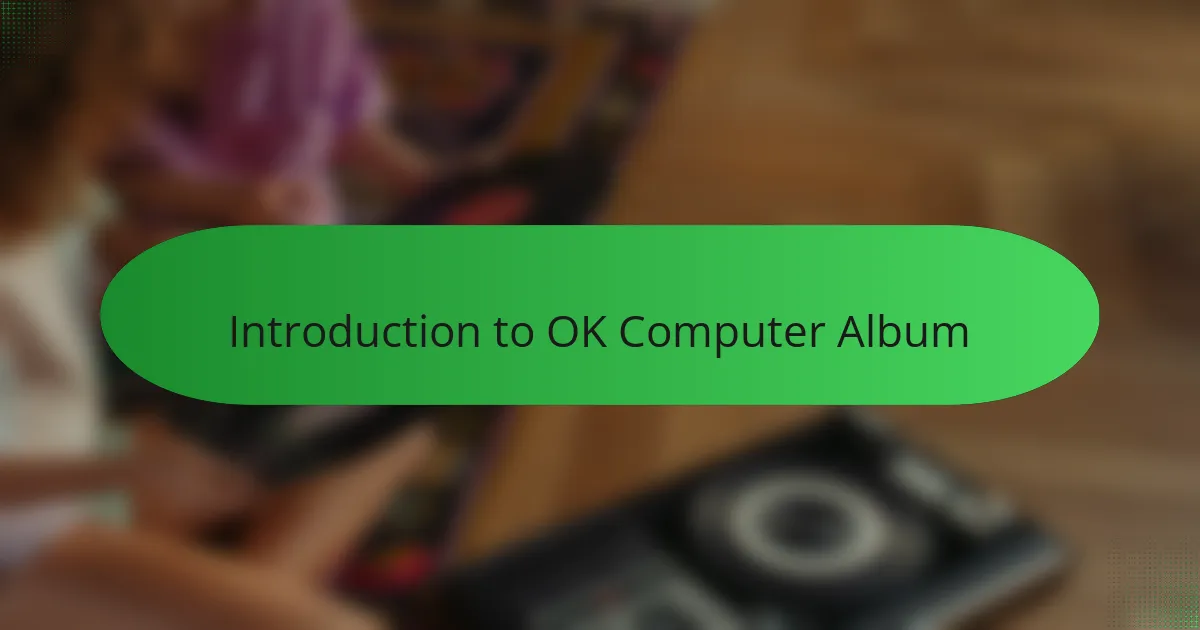Key takeaways
- The connection between rock bands and fans creates a powerful emotional bond, enhancing the experience of music and live performances.
- Radiohead’s OK Computer explores themes of alienation and technology, enveloping listeners in a continuous narrative rather than individual songs.
- Analyzing the album involves a blend of digital tools and personal techniques, leading to deeper insights and emotional connections with the music.
- The experience of transcribing lyrics and exploring sound elements transforms music analysis into a meaningful personal exploration of shared human experiences.

Understanding Rock Bands and Fans
When I first started diving into the world of rock bands, I was amazed at the intricate relationship between the bands and their fans. Have you ever noticed how a band’s music can feel like it speaks directly to you? It’s as if the emotional highs and lows in their songs mirror our own experiences, creating a powerful connection.
Fans don’t just listen; they live through the music. From my experience attending concerts and fan gatherings, I’ve seen how collective energy turns songs into shared memories. This bond fuels the band’s creativity and drives fans to explore deeper meanings behind the lyrics and sounds.
What makes rock music unique is this unspoken dialogue between artist and audience. It’s a mix of admiration, critique, and emotional investment. I often wonder how this dynamic shapes the evolution of a band’s sound over time — and how fans adjust their expectations as the music grows.

Overview of Radiohead as a Band
Radiohead has always stood out to me as more than just a band; they’re an evolving collective of musicians pushing boundaries. From the moment I first heard their sound, I felt they weren’t content with sticking to one style—they seemed driven by curiosity and a desire to challenge both themselves and their listeners.
What fascinates me most about Radiohead is how each member brings a unique voice, blending guitar textures, electronic elements, and Thom Yorke’s haunting vocals into something truly distinctive. Have you ever caught yourself replaying a song, discovering new layers every time? That’s exactly the experience Radiohead crafts so intentionally.
Over the years, I’ve followed their journey from alternative rock beginnings to more experimental landscapes, observing how their commitment to authenticity resonates deeply with fans. Their music sparks questions about technology, society, and our own inner struggles—making every album feel like a conversation we’re invited into, not just a collection of songs.

Introduction to OK Computer Album
OK Computer grabbed my attention the moment I pressed play. It wasn’t just another album—it felt like a window into a world where technology and humanity collide in uneasy harmony. Have you ever listened to an album and sensed it was capturing the anxieties of an entire generation? That’s exactly what Radiohead achieved here.
What struck me most was how OK Computer blends haunting melodies with unsettling themes, weaving songs that feel both intimate and expansive. From the eerie opening notes of “Airbag” to the prophetic warnings in “Paranoid Android,” I found myself drawn into a sonic landscape that challenged my expectations of rock music.
Reflecting on my first listen, I remember feeling a mix of awe and disquiet. The album felt like a puzzle—each track offering clues about modern isolation, technology’s impact, and the fragility of human connection. It sparked a curiosity in me to dig deeper, not just into the music, but into the world Radiohead was painting with their art.

Key Elements of OK Computer Analysis
One of the key elements I focused on during my analysis was the album’s profound thematic cohesion. Have you ever noticed how OK Computer doesn’t just deliver individual songs, but rather a continuous narrative exploring alienation, technology, and paranoia? That seamless flow hooked me, making each listen feel like uncovering another layer of Radiohead’s vision.
Another aspect that stood out to me was the innovative sound design. I spent hours dissecting the blend of unconventional guitar effects, electronic textures, and Thom Yorke’s distinct vocal delivery. This combination not only shapes the mood but also serves as a vehicle for the album’s unsettling atmosphere—something that challenges typical rock norms in a very deliberate way.
Lastly, the lyrical depth struck a personal chord. I found myself reflecting on lines that spoke to modern anxieties and emotional disconnection, resonating with moments from my own life. How often do we come across music that feels like it’s articulating thoughts we barely dare admit? That connection is exactly what makes analyzing OK Computer such a compelling experience for me.

Tools and Techniques for Music Analysis
When I dove into analyzing OK Computer, I found digital tools like audio editing software invaluable. They let me isolate individual tracks and slow down complex sections, which made it easier to catch subtle guitar nuances and electronic layers that aren’t obvious at first listen. Have you ever tried replaying a brief guitar riff so many times that it suddenly feels like a new instrument altogether? That’s the kind of discovery these tools enabled for me.
Beyond software, I relied heavily on traditional techniques like waveform analysis and close listening sessions. Sitting in a quiet room with headphones, I’d play a song repeatedly, focusing on different elements each time—the drum patterns, background effects, or vocal inflections. This patient approach revealed how Radiohead masterfully balanced chaos and precision, something software alone can’t fully capture.
I also took time to transcribe sections of melodies and lyrics by hand. Writing down Thom Yorke’s words helped me connect emotionally, forcing me to slow down and wrestle with the meanings behind cryptic phrases. Has a handwritten lyric sheet ever made you see a song in a new light? For me, it turned analyzing OK Computer from a technical exercise into a personal exploration.

Personal Experience Analyzing OK Computer
Diving into OK Computer felt like unlocking a secret diary that belonged to the late ’90s, where I found myself caught between fascination and unease. I remember sitting alone, headphones on, utterly absorbed as the album’s eerie atmospheres crept under my skin. Have you ever had a record that felt less like music and more like a profound conversation with your own thoughts? That was exactly my experience with this masterpiece.
What really hooked me was how each listen revealed something new—whether it was a subtle synth line or a nuanced vocal inflection I’d missed before. I kept asking myself, “How do they make it feel so layered and unpredictable, yet cohesive?” This constant discovery made the analysis feel less like a chore and more like a rewarding journey.
At times, I found certain lyrics striking chords that resonated deeply with my own anxieties about technology and isolation. Writing down these lines by hand changed how I connected with the album; it almost felt like Radiohead was speaking directly to me. Have you noticed how transcribing music slows your mind and deepens your understanding? For me, it turned my analysis into a truly personal experience.

Insights Gained from the Analysis
One insight that really stood out to me was how OK Computer manages to capture the anxiety of a rapidly changing world without losing its emotional core. It made me wonder—how often do albums reflect not just a moment in time, but the collective unease of a generation? In Radiohead’s case, their ability to blend sonic experimentation with deeply human themes made this clear.
I also realized that analyzing OK Computer isn’t just about breaking down sounds or lyrics; it’s about uncovering the layers of intention behind each choice. For example, the way guitar effects and electronic textures interplay taught me how much thought goes into creating an atmosphere that both unsettles and connects. Have you ever noticed how a certain sound can evoke a feeling you can’t quite put into words? That’s exactly the kind of subtle storytelling Radiohead excels at.
Finally, the personal connection I developed through this analysis surprised me. Transcribing lyrics and focusing on subtle details transformed the album from something I admired from afar into a profound conversation with my own thoughts. It made me ask myself, what does it mean when music feels like it’s articulating the feelings we struggle to express? For anyone diving into this album, I’d say the insights gained extend beyond music—they touch on our own human experience.